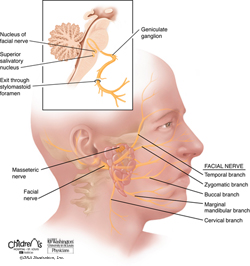What is Facial Paralysis?

The facial nerve is responsible for facial expression. The facial nerve begins in the brainstem, then takes a course through the temporal bone of the skull, before dividing into multiple branches within the face. Each branch provides specific movement.
In children, facial paralysis can happen for a multitude of reasons. It is very rare for facial paralysis to be inherited. There are more than 100 known causes of facial paralysis. When we make facial expressions (such as smiling, frowning, and closing our eyes), the brain sends a signal to the muscles of our face through the pathway of the facial nerve (also known as the 7th cranial nerve). When there is a problem with this pathway, facial paralysis is the result. Two of the more common causes of facial paralysis are outlined below.
Congenital Facial Paralysis
Congenital facial paralysis can occur on one side of the face (unilateral facial paralysis) or both sides of the face (bilateral facial paralysis) (see Figure A). Unilateral facial paralysis can be related to conditions such as hemifacial microsomia, in which one half of the face does not develop as fully as the other, sometimes producing less facial motion on the affected side.
Acquired Facial Paralysis
In some cases, babies delivered with the aid of forceps sustain an injury to the facial nerve. In most cases this injury is temporary and resolves within several months. However, in other cases the paralysis can persist, resulting in a difference in movement between the two sides of the face. In some of these cases surgery may be recommended to improve facial motion. Other forms of trauma can also produce facial paralysis in children, including head injury (concussion), cuts which divide the facial nerve, and damage to the actual muscles that produce motion.
The Facial Nerve Institute at St. Louis Children's Hospital specializes in the diagnosis and treatment of facial paralysis in infants and children.
For more information or to schedule an appointment with a pediatric facial nerve doctor, call 314.454.5437 or 800.678.5437 or email us.










